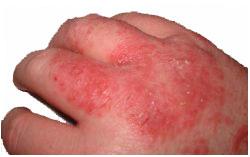Eczema Information
Click here to scroll to the list of available medications ↓
Eczema is also known as atopic dermatitis, a skin condition that affects the skin. It is most often associated with accompanying diseases such as asthma or hay fever. Eczema is a long term condition, one that requires constant treatment and has little time of remission behaviors. It is most often known for its tremendously discomforting itchiness that can be bad enough to drive grown adults to tears. Eczema can strike young children, babies, adults, and everyone in between. In most cases, babies or children are diagnosed and end up fighting the disorder well into their adult years, sometimes even for the rest of their lives.
There are varying symptoms related to eczema. The common factor, itchiness, is often accompanied by a rash of varying degrees and rashes which bear little or no resemblance to each other. Reddish to brown or even gray looking patches may cover the skin in either an isolated area or completely cover the body. The itching of any of the described rashes tends to be quite severe, especially at night while the body is attempting to rest. Many small raised bumps may appear. If these bumps are scratched, they tend to ooze a clear liquid and the crust over, sometimes scarring. The skin can become thick and scaly, cracking with subtle movement. The skin is often left very sensitive to all sensation form the combination of intense itching and scratching.
The rashes can form anywhere on the body, but there are a few telltale places that they tend to almost always gather. Behind the knees, the neck, ankles, wrists, face, and the upper chest are the most frequently affected areas. It is not uncommon to find scaling around the eyes and excessive crusting at the corners of the eyes. It is also rather common for eczema to flare up in repetitive cycles, although the cycles may break for long periods of time, even years. Scratching keeps the cycles of outbreaks frequent and long term.

There are certain actions which can create a worsening symptomatic situation, which can often help in the diagnosis, if need be. Harsh soaps, cleansers, solvents, dust, sand, man made synthetic fabrics, low humidity, abrupt temperature fluctuations, sweating, stress, drying of the skin, lengthy hot baths or showers, and cigarette smoke are all triggers that create a worsening of the symptoms of eczema.
There is no clear cut cause for eczema. Most dermatologists and physicians believe that eczema starts off as regular dry and itchy skin, but the immune system over reacts and creates an impossible situation for the sufferer. There is an obvious connected link between eczema and allergies or asthma, especially in young children. Children who tend to suffer from eczema are three times more likely to develop asthma as they grow.
A visual examination of the skin is the only reliable test, along with patient medical history, for determining eczema. There is no formal test and a skin culture is worthless, as eczema does not show up as a virus or an infection. Most physicians take a personal and family medical history and do routine physical examinations to determine the presence of eczema.
Complications resulting from eczema may include darkening and scarring of the skin, especially when the patient can not resist the need to scratch. Infection may result as a result of intense scratching, usually impetigo. When the skin becomes leathery and ill colored in one specific area, this is known as neurodermatitis. Severe cases of eczema can result in complications involving the eye. When there is obvious eye complications involved, the patient should seek immediate health care from a physician.

Eczema is treated with three basic goals in mind; relieve the itching, reduce the inflammation, and prevent the reoccurrence. There are several methods of treatment, although finding the right one can be a long and brutal challenge. Corticosteroid creams and ointments can often relieve the itch and reduce the inflammation. Oral antihistamines are often prescribed to help alleviate the itch or if long term use of a corticosteroid cream is causing long term side effects, such as thinning of the skin and stretch marks or infection. Medications to control the inflammation and to prevent future flare ups can run the risk of serious side effects.
Phototherapy, or light therapy, is a common first choice for patients who have a difficult time with medication. While phototherapy has been proven effective, it has also been proven to have significant potential side effects, including skin cancer. The most important aspect of controlling eczema is avoiding obvious and known irritants. Something as innocent as a down comforter can keep a patient in agony for months even after the comforter has been replaced. Knowledge about triggers is power against the battle of eczema.